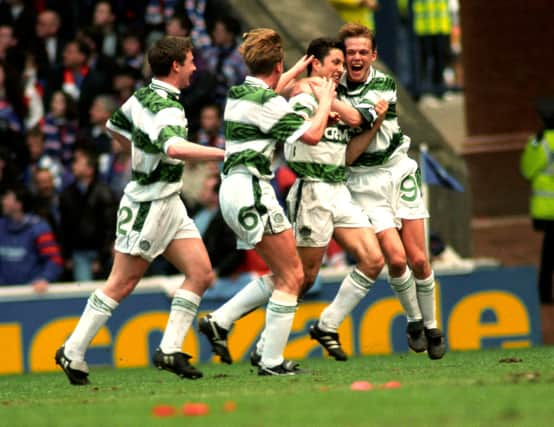Recalling only Celtic goal against Rangers without own fans, aeroplane message and more


On that afternoon, John Collins scored Celtic’s only goal against Rangers netted without an official club support in attendance to witness it. Yet, the Covid-19 pandemic restrictions mean that when Saturday rolls around and the ancient adversaries battle it out at an empty Celtic Park, Collins’ could cease to be the only player to net in such circumstances.
I have spoken much to the affable and insightful Collins often about his peerless free-kick that earned Lou Macari’s men a commendable draw against a domestic rampant Rangers in an unprecedented environment. One created by Ibrox club owner David Murray banning Celtic supporters, a decision taken as the result of damage to seats at the stadium in previous derby fixtures.
Advertisement
Hide AdAdvertisement
Hide AdIt forced Collins to twist in on himself to celebrate the opener he had curled in at the top right-hand corner of Colin Scott’s net. To the midfielder it didn't feel right there was no side, no section, no slice of the 46,000-capacity Ibrox that housed like-minds to bound towards. A special goal, “yes”, he has reflected to me, because no player at the club had scored in the storied fixture in similar fashion. A “hollow” one too, though.
Scoring to silence – and some undercover fans
"The pleasure in scoring is seeing the joy and happiness on the faces of the people who live for your team; hearing them singing,” he said of his net-billowing moment, in what is now known simply as ‘the fan-ban game’. “They are the heartbeat of a football club but it was only my blood and the blood of my team-mates I could see pumping after the ball hit the net."
He also heard "a couple of mouthfuls of abuse aimed in my direction from Rangers fans". It wasn't these oaths alone, though, that punctured the eerie silence that descended on the ground after his deadball expertise. There were the shouts of the team-mates that engulfed him, and the cheers of isolated Celtic fans who had wangled tickets to sit among the home legions.
The inevitability that some – thought to number in the region of 150 – would go "undercover" to gain entry threatened to make Murray's stand against the "wanton vandalism" of destroyed seats in the away end at the previous Ibrox derby give way to other violence. In the end, that was restricted to coins being pelted at several police as they led Celtic supporters around the track after the fans had outed themselves at their team's goal. "It was the weirdest thing when we ran out to warm-up and the Broomloan Stand was a sea of blue,” Collins said. “After that, mind you, I just focused to the exclusion of everything happening around about, as you must."
Standing firm – then a compromise
Exasperated by Celtic's unwillingness to stump up £7,800 for the 384 seats broken during their side's 2-1 win the previous October, Murray decided to deny Celtic their standard 7,500 allocation from the final derby in January 1994. He detailed £20,000 of damage at the visiting end across the previous six Ibrox derbies as he did so.
Celtic remained immovable in their belief that all liabilities were the responsibility of the home club, pointing out they had always incurred these when Rangers came to the east end of the city. But as the visiting end at Parkhead was then standing, there was not the same potential for such costs. The decision not to accede to Murray's demands on the matter was one of the few policies that survived regime change at Celtic and the Fergus McCann buy-out in March that year.
The new owner did eventually seek a compromise, offering to indemnify Rangers in future so long as Celtic were allowed to organise the stewarding of their own support in future. When this proposal was rejected, the Celtic directors elected to boycott the derby, instead choosing to join the 12,000 Celtic supporters who watched their reserves beat Rangers 3-1 that day.
Planes, new boot and destroying myths
On the pitch beforehand, Duncan Ferguson indulged in a knockabout kick-about with a man dressed in a bear costume. After passing the ball back and forward for several minutes, Ferguson's furry friend came up and mockingly stuck the head on the striker, a nod to Ferguson's ‘Glasgow kiss’ on John McStay a fortnight earlier. The howls of laughter upped in decibels when the bear was revealed as injured keeper Andy Goram. These were brought to an abrupt halt when a plane flew overhead trailing a banner proclaiming: ‘Hail Hail The Celts Are Here’. "That was genius," Collins said. "Celtic supporters have a great ability to come up with different, fun ways of supporting the team, and the guy who hired that plane carried on an admirable tradition."
Advertisement
Hide AdAdvertisement
Hide AdCollins, meanwhile, started a new one by scoring with the "revolutionary" new boot he had only taken delivery of only two days before, and which he had tapped confidently in the dressing room beforehand and said would bring him a goal. "It was the first scored with these boots and for years the strike was shown in Adidas's promotional films," he said.
Rangers' 79th minute equaliser was not the sort to be replayed endlessly, an Alexei Mikhailichenko shot spinning off the boot of Mark McNally to loop over Pat Bonner. It did, though, prevent Murray's stance backfiring on him spectacularly. For his manager Walter Smith the encounter "finally killed the myth about a crowd influencing the match". “A 45,000 [crowd] might be fine when we’re winning. If we are losing, it is not so clever," Smith said.
For all members of the thin green line at Ibrox that day the moral victory was theirs. “Everyone said we would go there and get turned over big time,” said Collins.
Comments
Want to join the conversation? Please or to comment on this article.